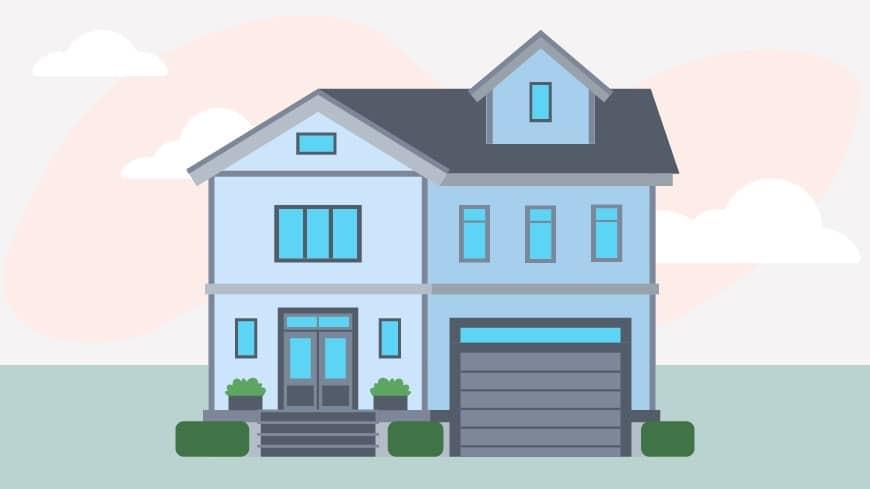Can I Refinance My Mortgage to Pay Off Debt?

Are you wondering if refinancing your mortgage could help you pay off debt? The idea of using your home’s equity to consolidate credit card balances, personal loans, or even student loans can seem like a great solution.
If your monthly payments are stacking up, or if you’re juggling high-interest debt, a cash-out refinance might be the financial tool you need.*
In this article, we’ll walk you through how refinancing works, how it can help consolidate debt, and how to apply for a cash-out refinance step-by-step.
How Does Refinancing Work?
Refinancing your mortgage is simply the process of replacing your current mortgage with a new loan.
Refinancing could lower your interest rate, shorten your loan term, or allow you to access your home equity to pay off debt.
Is Refinancing a Mortgage to Consolidate Debt a Good Idea?
Homeowners generally refinance to reduce their monthly mortgage payments, secure a fixed-rate mortgage, or switch from a variable-rate loan to a fixed-rate one.
When you refinance, the lender pays off your existing mortgage, and you begin making payments on the new mortgage.
The new loan may come with a lower interest rate or better terms, depending on your credit score and financial situation.
Ultimately, refinancing to consolidate debt can work well if it reduces your interest rate and simplifies monthly payments, and aligns with your overall financial goals. However, you’ll need to consider the long-term impact on your mortgage and budget.
Step-by-Step Guide to Refinancing for Debt Consolidation
Refinancing your mortgage can be a smart financial move, but understanding each step is essential to ensure you get a loan that fits your financial debt consolidation goals.
Evaluate Your Financial Situation
Before deciding to refinance, take a close look at your credit score, home equity, and outstanding debts, including any high-interest debts like credit card debt or personal loans.
These factors determine whether refinancing makes financial sense for you and can influence the mortgage interest rate you’ll receive.
Choose the Right Loan Type
Refinancing offers several options, from a fixed-rate mortgage to a cash-out refinance.
If you’re considering tapping into your home’s value, a home equity line of credit (HELOC) or an FHA refinance may be suitable.
Decide which loan type fits your long-term financial goals and helps manage your debt.
Compare Lenders
Not all lenders are the same, so it’s essential to shop around for the best deal. Look for a lender offering a competitive interest rate, favorable loan terms, and manageable closing costs.
Remember, even a small difference in the interest rate can save you money over the life of the loan.**
Refinancing could be your key to better debt management, especially if the new mortgage comes with a lower interest rate or more favorable loan terms.
How Refinancing Impacts Your Monthly Payments
Refinancing can reduce your monthly mortgage payment by securing a lower interest rate or extending your loan term.
However, if you opt for a shorter loan term, your monthly payments may increase, even if you save on overall interest. Balancing your monthly payments with your financial goals is key.
If you’re consolidating debt, like credit card balances or medical bills, it’s critical to ensure your new loan fits within your budget.
Refinancing Costs to Consider
Refinancing involves more than just securing a new loan—it comes with various costs that you need to consider. Understanding these fees can help ensure that the savings from your lower interest rate outweigh the upfront costs.
Closing Costs
Closing costs can range from 2% to 6% of the loan amount. These costs cover processing fees, title searches, and attorney services.
It’s crucial to make sure you have enough equity in your home to justify refinancing and cover these expenses.
Lender Fees
Lender fees, also known as origination fees, are charges for processing the loan. The amount varies by lender and is usually a small percentage of the loan amount.
Shopping around and checking NMLS-licensed lenders can help you find the most competitive rates.
Appraisal Fees
An appraisal is often required to assess the current value of your home, especially for a HELOC or home equity loan. This cost usually ranges between $300 and $500, depending on your property and location.
Title Insurance
When refinancing, you may need to purchase new title insurance to protect against any ownership disputes. This cost can vary, but it is a one-time fee that safeguards your investment.
Prepayment Penalties
Some loans come with prepayment penalties if you pay off your current loan too early. If your debt management plan includes consolidating types of debt, check if your current mortgage has this penalty.
Can I Refinance My Home Loan to Pay Off or Consolidate Debt?
If you’re juggling multiple high-interest debts, debt consolidation through refinancing can simplify your payments and reduce your overall interest charges.
A debt consolidation loan allows you to pay off high-interest debts—like credit card debt, personal loans, or medical bills—by rolling them into one loan: your new mortgage.
What Is a Debt Consolidation Loan?
A debt consolidation loan lets you combine multiple high-interest debts, like credit cards or personal loans, into one new loan—usually with a lower interest rate. It simplifies your payments and could save you money on interest in the long run.
How Does Refinancing a Mortgage for Debt Consolidation Work?
By refinancing your mortgage, you can use your home equity to pay off unsecured debts like credit card balances, medical bills, or even a balance transfer from high-interest loans.
This simplifies your repayment into a single, manageable monthly mortgage payment. You’re essentially taking your high-interest debts and bundling them into a loan with a potentially lower interest rate.
Potential Impact on Your Credit Score
When refinancing to pay off debt, it’s important to understand how the process might affect your credit score. Consolidating high-interest debt into a mortgage can initially cause a slight dip due to the hard inquiry on your credit report.
However, in the long term, paying off unsecured debts like credit cards and maintaining lower balances can improve your credit utilization ratio and boost your score.
Consider monitoring your credit score before and after refinancing to ensure you’re making positive progress.
Which Debts Can I Consolidate with a Mortgage Refinance?
Common debts that homeowners consolidate include high-interest credit cards, student loans, and personal loans. By consolidating these into a mortgage loan, you reduce the number of payments and may lower the interest rate on your debt.
Advantages of Debt Consolidation via Refinancing
By consolidating debt into a mortgage refinance, you could lower your interest rate and reduce your monthly payment.
Over time, a lower rate could significantly cut down the amount you pay in interest charges throughout the life of the loan.
This gives you more breathing room in your budget, allowing you to achieve your financial goals faster.
What Are the Benefits of a Cash-Out Refinance?
A cash-out refinance allows you to unlock the equity in your home and use the extra cash for various purposes. Here are five key benefits of a cash-out refinance.
Access to Home Equity for Financial Goals
A cash-out refinance provides access to your home’s value, giving you a lump sum of cash. You can use this money to pay off high-interest debts, like credit card debt or medical bills, or even fund home improvements that will further increase your home’s value.
Lower Interest Rates Compared to Other Loans
Compared to personal loans and credit cards, the interest rate on a cash-out refinance or home equity line of credit (HELOC) is usually lower.
This makes it a great option for debt consolidation, especially when dealing with high interest rates on unsecured debts.
Consolidating High-Interest Debt
If you have high-interest credit cards or other forms of unsecured debt, consolidating them into your mortgage can reduce your interest payments significantly.
By shifting your debts into a lower-interest mortgage, you could save hundreds—or even thousands—over time.
Home Improvement Funding
Many homeowners opt for a cash-out refinance to make major home improvements, which can increase their home’s value and create additional home equity down the road.
This allows you to enhance your property while also potentially improving your financial standing.
Flexible Use of Funds
With a cash-out refinance, the funds are yours to use however you need. Whether it’s for real estate investments, educational expenses, or debt consolidation, you have the flexibility to apply the cash where it will benefit you most.
What Are the Risks of Using a Cash-Out Mortgage Refinance for Debt Consolidation?
While a cash-out refinance can be beneficial, there are risks and costs to be aware of before proceeding. Understanding these aspects will help you make an informed decision about your home loan.
Impact on Long-Term Loan Costs
When you take out a cash-out refinance, you’re increasing your loan amount, which could extend your loan term.
This could result in paying more interest over the life of the loan, even if your monthly payments decrease. Always weigh the impact on long-term costs when deciding to refinance.
Higher Interest Rates for Cash-Out Refinances
A cash-out refinance may come with higher interest rates compared to traditional refinancing. Make sure to compare mortgage rates across lenders to find the most competitive deal.
Risks of Increasing Your Loan Balance Over House Worth
Increasing your mortgage balance with a cash-out refinance could leave you owing more than your home is worth if real estate values drop.
Carefully evaluate your debt payments and the risk of having to take out a second mortgage in the future.
Other Cash-Out Refinance Costs to Consider
Keep in mind that closing costs and other fees could add up. You should also consider whether any of these costs are tax-deductible.
If you have mortgage insurance, also factor this cost into your decision.
How Can I Apply for a Cash-Out Refinance Today?
A cash-out refinance can be a smart way to tap into your home’s equity, whether you’re looking to consolidate debt or fund a major expense.
Rate's Mortgage Refinance offers competitive rates and no hidden fees, making the process simple and stress-free.
*Using funds from a Cash-out Refinance to consolidate debt may result in the debt taking longer to pay off as it will be combined with borrower’s mortgage principle amount and will be paid off over the full loan term. Contact Rate, Inc. for more information
**Savings, if any, vary based on consumer’s credit profile, interest rate availability, and other factors. Restrictions apply.
By refinancing, you may pay more in costs and interest over the extended term.




